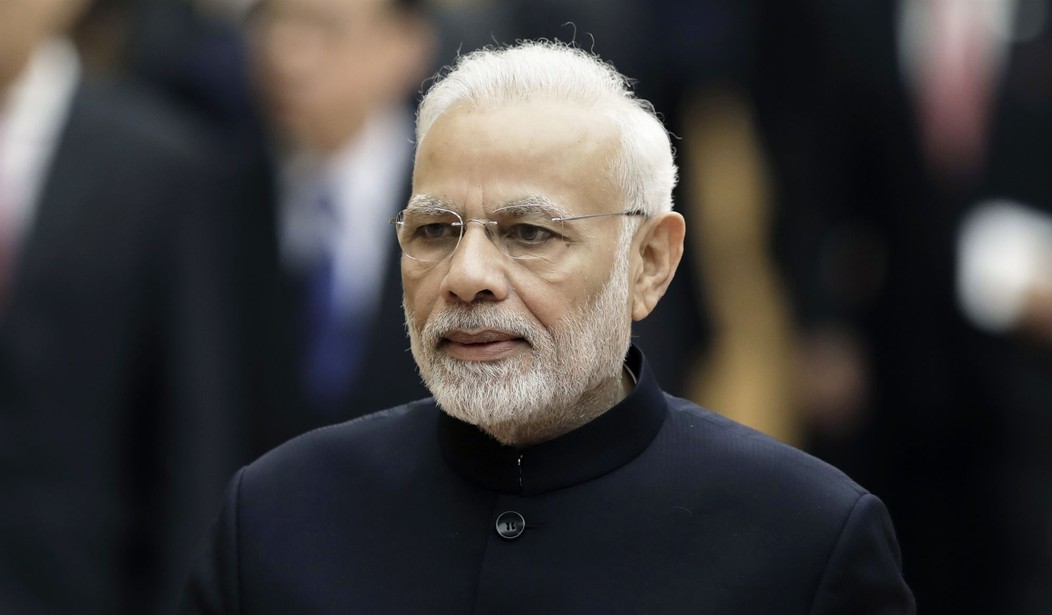Everyone who took geography in high school (back when the public schools actually taught such things) is no doubt familiar with India. It takes up an entire subcontinent and now has the largest population in the world, recently surpassing China. But we all may have to get used to calling it something else. The current government of the nation has been considering formally changing its name to Bharat. And they seemed to be moving in that direction when they recently sent out state dinner invitations to attendees of the upcoming G20 summit which made reference to the “President of Bharat.” The move has been described as an effort to break away from India’s colonial past and its relationship to the former British Empire. (CNBC)
The streets of India’s capital were rife with speculation Wednesday that the government might be about to scrap the use of the country’s English name — a dramatic new step in an effort to break with its colonial heritage and appeal to its hard-line Hindu nationalist base.
The rumors were fueled by a state-issued invite to a dinner reception for world leaders during next weekend’s G20 summit, which referred to the country’s head as the “President of Bharat” — the Hindi or Sanskrit version of the word “India.”
“Better late than never,” Akash Tiwari, a private security officer in New Delhi, told NBC News of the rumored change. “It used to be Bharat before. The change is good,” he added.
There isn’t much for the rest of us to say about this change, assuming it happens. If the people of India want their country to be known as Bharat, that’s entirely up to them. Also, it’s not as if they’re just making up a new name out of thin air or as a passing fad. India was called Bharat until the British showed up in the 1850s and decided they would run the place for a century or so. “India” is the English translation of Bharat.
It’s also not as if the change would have much of an impact on everyone else. Yes, mapmakers will likely start scrambling to make changes, but national borders and titles change all the time so they are used to that. Publishers of school books might also see a brief rise in revenue since all of the maps in those tomes will need to be altered as well. But I’m guessing that a lot of us of “a certain age” will probably keep calling it India. It’s a hard habit to break.
The government of India appears to be working to appease its Hindu Nationalist base, referred to as Hindutva. That sect has been around for a long time, dating back to the 19th century. One of their core tenets states that “Indian national identity and culture are inseparable from the Hindu religion.” They also represent the dominant power in the government currently.
Hindu Nationalism, largely driven by Prime Minister Narendra Modi, has been spreading far beyond the borders of his own country. It’s shown up nearly everywhere the Southeast Asian diaspora has arrived, including in the United States. And that has led to some conflicts that don’t always generate a lot of headlines but can become quite heated.
While his supporters credit him with making India a presence on the global stage, his critics accuse him of fanning the flames of Hindu nationalism in India and abroad. At its most extreme, the nationalist movement seeks to create a Hindu India, perpetuating the narrative that Hindus are oppressed in the country, and abetting violence and discrimination against Muslims and other minority groups, experts told NBC News.
In the U.S., Hindu nationalism can take the form of cultural youth groups, but also online doxxing and harassment campaigns against dissenters. Charity work might operate parallel to lobbies against bills aimed at protecting those born into lower castes in India’s caste system, according to experts.
It’s unclear how much Hindus in India are really suffering from oppression in the current era. In fact, they are a majority in many parts of the country and hold majorities in the legislature. Other groups have previously accused the Hindutva of the same sorts of abuse, particularly the Muslim minority. But however real the oppression of the Hindus may or may not be, that doesn’t really matter as long as they believe it and they act on those beliefs in a political fashion.
What is clear is that the politics of India are undergoing a shift. That has been made even more clear by the war in Ukraine, where India has refused to participate in sanctions against Russia and maintained relatively normal trade relations with them. I wouldn’t characterize modern India (or Bharat if you prefer) as being part of the modern Axis of Evil at this point, but they are definitely not solidly in the same camp with NATO and the West, either. It’s just something to keep our eyes on as global alliances continue to shift in the 21st century.








Join the conversation as a VIP Member